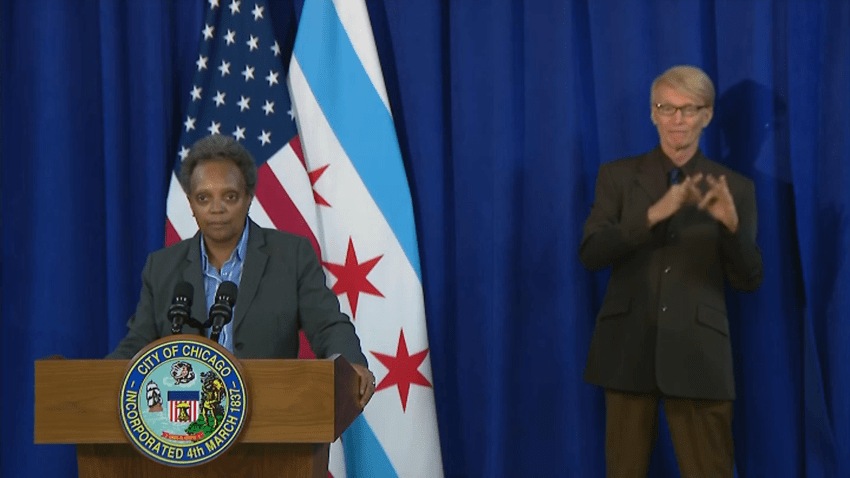Chicago Mayor Lori Lightfoot breaks down what she now knows about a botched CPD raid and her office’s controversial handling of the situation that followed.
The Chicago mayor's office released a statement Friday evening calling for officers involved in the botched Chicago police raid caught on body worn cameras be identified and held accountable.
After controversy pursued over the past week over what information Mayor Lori Lightfoot knew about the CPD raid, her office said the city's law department provided Anjanette Young's attorneys with the video on Feb. 21, 2020 connected to the incident.
"At that time, the Law Department clearly failed to search all potential locations where corresponding [body worn camera] video could be located. 14 videos were turned over to Ms. Young’s counsel," the statement said.
The mayor's office said on March 9, 2020 Young's counsel dismissed the lawsuit against the city, ending further searches for video by the law department in response to the order.
After news of the incident came to light, the Chicago mayor ordered that all body worn camera video footage be released to Young, the press and the public, according to her office.
"While this failure to produce the additional six videotapes was inadvertent and not intentional, nonetheless, it was completely unacceptable. The Mayor has directed that all individuals responsible for this discovery failure be identified so they can be held accountable."
Lightfoot said one of her biggest questions as she stares down a recent political crisis surrounding the CPD raid footage is why she didn't know about it sooner.
Local
In a one-on-one interview with NBC 5 Friday, Lightfoot questioned how video of the raid, which showed police storming into the wrong home and handcuffing Young in early 2019, wasn't shown to her until this week - nearly two years after the incident itself.
"Obviously, with the benefit of hindsight, I wish that I had dug down deeper," Lightfoot said. "I wish that somebody had notified me about the horrific nature of this video. That is one of the questions I have is who saw that video and didn't raise it to my attention? I'm very concerned about that because how could you not watch that and not say, 'Oh, here she needs to know this?'"
Lightfoot's administration fought in court this week to keep the footage from airing on television, a move the mayor said she also didn't know about.
Lightfoot has acknowledged that she was in fact made aware of the raid, which took place before she became mayor, last year, though she said she did not remember learning of it. She had previously denied knowing about the incident prior to this week, but later corrected to say she did not see the body camera footage until this week.
"At the time that this conversation was going on, internally, we were in the throes of the budget and I was working on a number of others issues," Lightfoot said. "Again, I own it. I wish I had known more, I wish I had asked more questions. At the time, I was focused on systemic change and making sure that that actually happened."
Among other questions Lightfoot said she's asking are how officers managed to get the address wrong and what happened once they realized they were in the wrong home.
"Obviously we see from the video some of the things that happen, but there's more I'm sure that will be learned over the course of the investigation," Lightfoot said.
On Friday, Lightfoot had her counsel move to withdraw sanctions against the attorney who represents the woman at the center of the raid and the controversy that followed.
“Today, at my direction, the Corporation Counsel filed a supplemental motion with the court to make a few things clear," Lightfoot said in a statement.
While Lightfoot said no sanctions were sought against the woman herself, the mayor said she asked her counsel to "formally move to withdraw sanctions against Attorney [Keenan] Saulter."
"While we remain concerned that a violation of a court order may have occurred, I believe that we should give Attorney Saulter the benefit of the doubt that he did not appreciate that the court's confidentiality order continued in full force and effect, even after the voluntary dismissal of the case in March 2020," Lightfoot said. "We urge the court to take no action against Attorney Saulter. I again want to reiterate and affirm my commitment to righting the wrongs in this case and moving forward with full transparency and accountability.”
Sanctions were sought against Saulter after video obtained by a federal lawsuit earlier this year was released, despite a confidentiality agreement. Saulter said the federal suit was dropped as he worked to pursue the case in state court.
The case has been at the center of controversy in Chicago as both Lightfoot and the city's top cop apologized for the handling of both the search warrant and the legal battle that followed.
The mayor has also said she "misspoke" Wednesday when she said that a Freedom of Information Act Request filed by the woman at the center of the raid was not denied.
"Miss Young did file a FOIA request," Lightfoot said. "That request was filed with the Chicago Police Department in November of 2019. That request was denied and I've asked for a top to bottom understanding of why that was denied."
Young and her attorney say police raided the wrong home on Feb. 19, 2019, as they served a search warrant. Recently released video showed officers handcuffed Young while she stood naked for several minutes, despite her repeated cries that they were in the wrong home.
Videos of the incident that Young obtained as part of her lawsuit against the city were released this week and obtained by NBC 5 Wednesday.
In the video, police officers can be heard knocking before shouting "police search warrant." Young can be heard crying and screaming, “You've got the wrong house, you've got the wrong house.” According to her attorney, Young repeated that phrase 43 times during the raid.
An officer ultimately threw a blanket over her shoulders at one point, but because she was handcuffed the blanket slipped off her shoulders, leaving her exposed again.
Lightfoot repeatedly apologized for the "colossal mess" that is still ongoing nearly two years after the incident.
"It left me upset, angry, appalled as a human being and as a Black woman," Lightfoot said. "And I immediately put myself in Miss Young's place and I know that this could happen to me, it could happen to any other Black or Brown person not in Chicago, but elsewhere."
Lightfoot said she reached out to Young's attorney and asked to meet her in person. She also touted a series of changes made this year to the police department's search warrant policies, including changes to the approval process for obtaining search warrants, ensuring multiple uniformed officers are present when such matters are conducted, a requirement that body cameras be worn and a policy for what to do should a warrant be executed on the wrong address.
But more changes are needed, Lightfoot said.
"Anytime a person who's a victim requests information about an incident that happened to them, our government's obligation is to respond in a fulsome, transparent and immediate way," she said, adding that "we will change our policies and procedures to make sure that a victim who reaches out shouldn't have to file for requests, should just get the information that they seek."

Lightfoot said she has since directed the city's law department to provide her with a review of all pending search warrant cases.
"If there are other wrongs that need to be righted, we are going to do just that," she said. "We're not going to string these cases out, we're not going to run up attorneys feeds. If we were in the wrong, we're going to own it."
That sentiment was one Chicago Police Supt. David Brown echoed.
"It's the right thing to do to be the first to admit your mistakes," Brown said Thursday. "The video of the raid of Miss Young's home is hard to watch. It's hard to feel Miss Young's anguish and fear and pain when viewing that video."
Brown promised accountability, saying "talk is cheap."
"Everyone deserves a measure of respect," Brown said. "Even if we had been in the right house, Miss Young should have been treated with respect. The fact that we are in the wrong house should have guided us toward even going further to respect this woman and her family. Because it's always the right time to do the right thing and we should have been first to admit a mistake."
Young said she is still dealing with the aftermath from the incident nearly two years later.
"This is so terrifying for me that two years later, I'm still dealing with it," Young said. "That the city has spent the last two years and, for lack of better words, is telling me that they did nothing wrong."

Both Young and her attorney criticized the city's, specifically the mayor's, handling of the case.
"There's a lot of trust that's been breached and I know that there's a lot of trust in me that's been breached," Lightfoot said Thursday. "And I have a responsibility to build back that trust and a responsibility to build back the trust of our city, of our police department and all of government."



